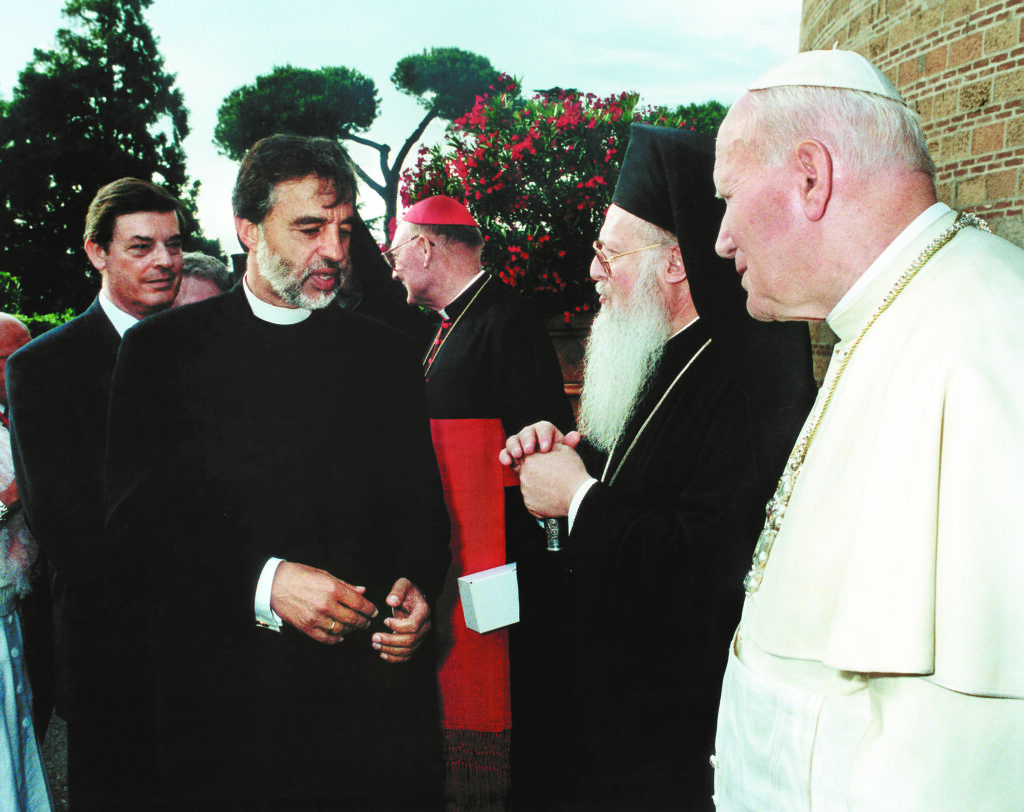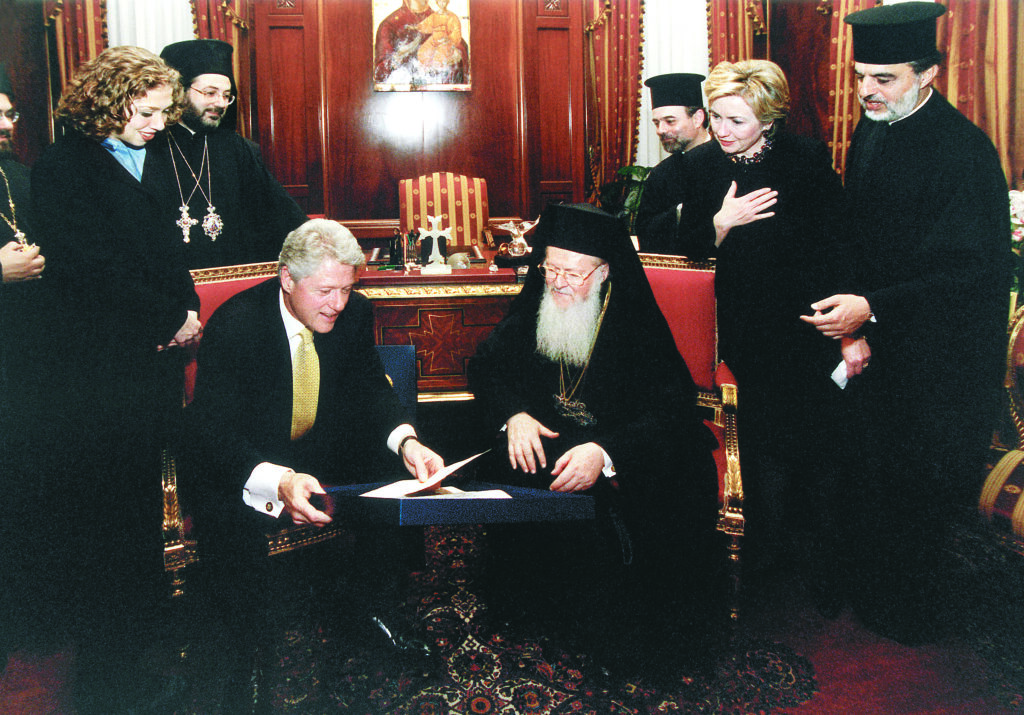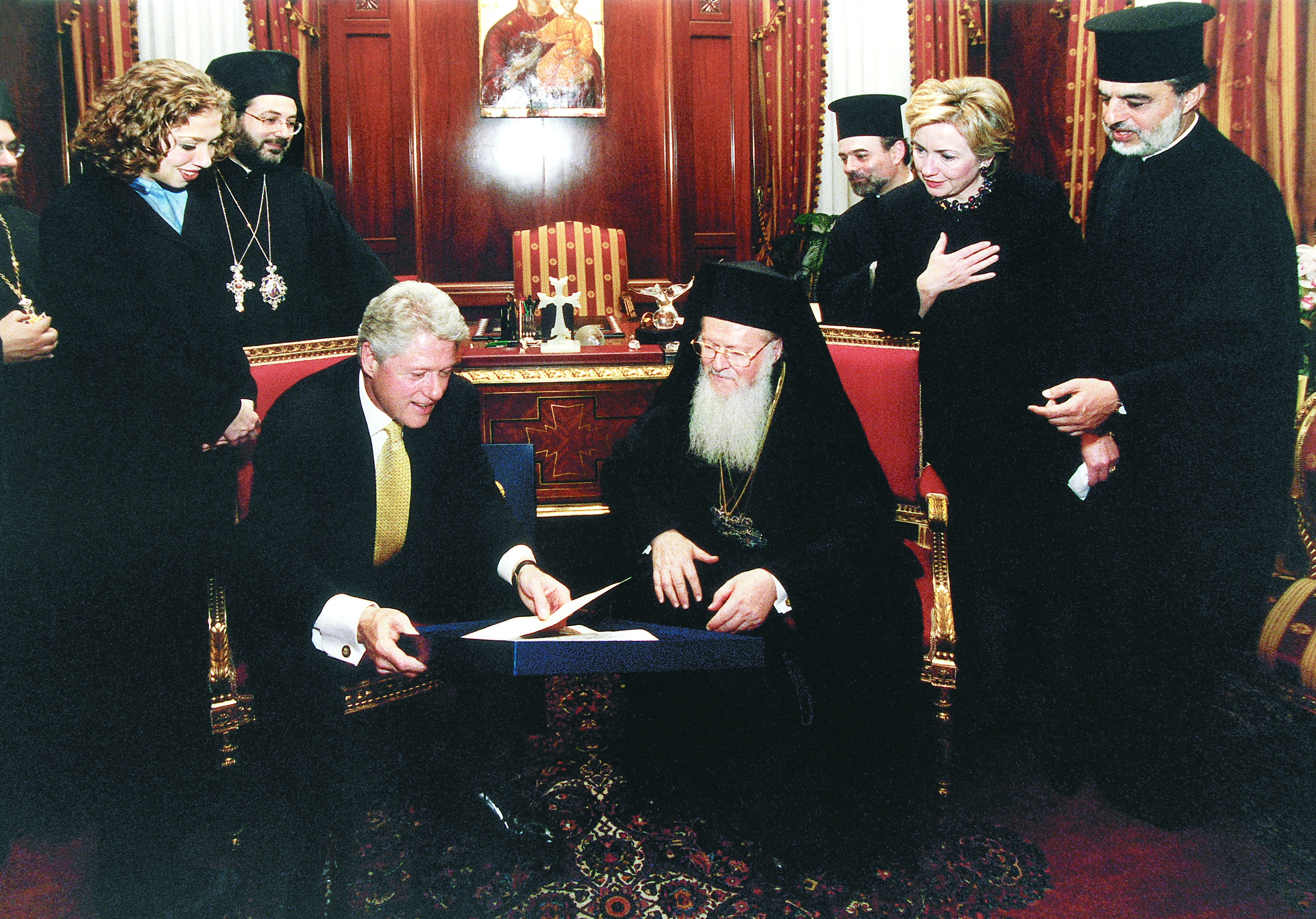
This is the third in a series of articles based on my interviews with Fr Alex Karloutsos. You can read the first two articles here:
The last article ended with the election of Patriarch Bartholomew and Fr Karloutsos’s subsequent “exile” from America to Istanbul. Today, I’ll continue this series, focusing on the decade of the 1990s.
Kissinger
It was a dark and stormy night.
“In 1983, we were living in Pelham Manor, Westchester County,” Fr Alex Karloutsos told me. “It’s about 11:30 at night, it’s raining cats and dogs, thunderbolts. It was unbelievable. I’m in bed late at night, and the doorbell rings. My wife says to me, ‘You can’t go down there. It could be somebody crazy.’ I said, ‘I’ve got to go down there – something’s wrong.’ There’s a knock on our door. Somebody might be in trouble. She finally relented, and I went down, and I opened the door. I recognized the guy immediately. He said, ‘I’ve got to call my father, sir. I’m a student at Yale University. Our car broke down on Highway 95.’ ‘Sure,’ I said, ‘The phone’s in the back.’ So he goes to make the phone call, and he comes back, and I said, ‘You know something – have your friends come in. We’ll make hot chocolate while you wait. But I want you to know – your dad is the most hated man in the Greek community.’ ‘What?’ ‘You’re Henry Kissinger’s son.’ ‘Yes, I am.’”
Henry Kissinger was the National Security Advisor to Richard Nixon when Patriarch Athenagoras died in 1972. With the patriarchal election looming, Kissinger told Vice President Spiro Agnew, “I don’t give a damn about the Turkish bishops. I give a damn about the Turkish government.” That Turkish government went on to veto the leading candidates in the election, including Archbishop Iakovos of North and South America and Metropolitan Meliton of Chalcedon, the mentor of the future Patriarch Bartholomew.
Two years later, Kissinger – by now serving as both Secretary of State and National Security Advisor – gave a tacit blessing for Turkey to invade Cyprus, beginning an occupation of the northern part of the island that continues to this day. Because of this, Kissinger became despised by many Greeks. But Fr Karloutsos took pity on his son David that stormy night in 1983.
The following year, Fr Karloutsos arranged for Archbishop Iakovos to give the closing prayers at both the Democratic and the Republican National Conventions. “On the night when Vice President Bush was to speak, I’m walking Archbishop Iakovos down the stairs to sit with Barbara Bush. I had arranged for Iakovos to sit on the right and Billy Graham to her left. Right behind Barbara Bush was Henry Kissinger with his son. So I walked down. David sees me, jumps out of his seat, and says, ‘Dad, this is Father Alex, the Greek Orthodox priest I was telling you about.’ Kissinger goes, ‘Father, I want to thank you for taking care of my son. I was so worried. And he told me what you did for him and how kind your wife and you were to him and his friends.’”
It happened that Kissinger was close friends with Ahmet Ertegun, the founder of Atlantic Records. Fr Karloutsos also became friends with Ertegun. One day in the 1990s, Ertegun was scheduled to host a dinner at the Chirigan Palace in Istanbul with Turkish prime minister Tansu Çiller, honoring Kissinger, who had been Çiller’s professor. Ertegun called up Karloutsos and asked if Patriarch Bartholomew would like to attend. “It would be his honor,” Fr Karloutsos recalled Ertegun saying, “for his wife Mica and him to host His All-Holiness along with the most powerful and influential people in Turkey.”
“So we’re there at Mica’s table, and I see Ahmet, and I say to Patriarch Bartholomew, ‘I have to get up now. I have to do something.’ He said, ‘What are you going to do?’ So I get up and I move towards Tansu Çiller and Ahmet Ertegun and Henry Kissinger. Ahmet sees me and goes, ‘Father Alex!’ and I said, ‘Ahmet, I just want to thank you. The patriarch wanted me to thank you for inviting him.’ Then I turned to Dr Kissinger. And I said, ‘Mister Secretary, how is David?’ He says, ‘Father Alex, it’s you! What are you doing here?’ I said, ‘Well, the Ecumenical Patriarch was invited by Ahmet, and I just wanted to say hello, and he wanted me to say hello to you.’ He said, ‘The Ecumenical Patriarch is here? Don’t you think I should go over and say hello?’ I said, ‘I believe that is the right thing to do, Mister Secretary.’ Now, remember that Henry Kissinger is like a god to the Turks. This is the guy who’s protected Turkey. He’s educated all those Turkish intellectuals, Turkish ambassadors, all these powerful businessmen. He’s been their greatest advocate. So all of a sudden, Tansu Çiller now sees this god get up, he walks across the room, this Turkish king, and where’s he walking to? So everybody’s looking – where is he walking to with a Greek Orthodox priest in front of him? I take him to the Ecumenical Patriarch. The patriarch got up and they conversed for ten minutes in German. Oh my gosh. So everything at the banquet is paralyzed because they’re seeing this. Now, when Tansu Çiller spoke, she did not recognize the Ecumenical Patriarch’s presence – but when Henry Kissinger spoke, he did, with great respect.”
“You realize, having Father Alex here, what he could do for us?” Metropolitan Joachim had said to his best friend Patriarch Bartholomew in 1992, when the patriarch broke normal protocol to request Fr Karloutsos’s transfer from Archbishop Iakovos. This is one of a great many examples of the service that Karloutsos provided to the Phanar.
John Paul II
“The [figurative] walls around the patriarchate are put up by the Turks on the outside, because they’re still invading from 1453,” Fr Karloutsos said. “The patriarch wanted to tear down the walls because everybody else lived in fear. Bartholomew is trying to get into the Turkish community, but they’re afraid of him and the Phanariotes, and he’s trying to connect with them. So who could tear down these walls separating the Phanar from the rest of Istanbul? That was my key role back then. I helped knock down a few walls and created a connection between the patriarchate and the business people and intellectuals of Turkey.”
But the walls weren’t just between the Phanar and the Turkish people – another sort of wall still separated the patriarchate from its American archdiocese. Fr Karloutsos explains that this was because of Archbishop Iakovos, who intentionally kept the patriarchate at an arm’s length from his people.
A pivotal moment came in June of 1995. Patriarch Bartholomew was scheduled to make an historic visit to Rome to meet with Pope John Paul II. Karloutsos seized the opportunity – if Patriarch Bartholomew wasn’t yet a larger-than-life figure in the Greek-American community, John Paul II certainly was. “They grew up with the Pope of Rome. They did not grow up with the Ecumenical Patriarch.” So Fr Karloutsos invited key Greek-American leaders and philanthropists to join the patriarchal entourage in Rome. The move had its intended effect. “They saw the Ecumenical Patriarch as equal to the Pope of Rome. They started understanding the majesty of the Mother Church.
“Four years had gone by since Bartholomew’s election, and Archbishop Iakovos had not gone to the patriarchate. There was tension between them. I’m the one bringing Greek-Americans to the patriarchate like John Kapioltas, the President of Sheraton, who got married in Constantinople. Iakovos can’t stop Greek-Americans from traveling, and he can’t stop me because I’m serving under the Mother Church. He can stop me from celebrating liturgy in America, but when I’m with the patriarch, I’m celebrating liturgy, and these people are seeing me serving the number one Orthodox hierarch in the world. They see that I haven’t died, they’re seeing that I can survive.”

The Clintons
Soon after this, in August 1995, Archbishop Iakovos paid a visit to Istanbul – his first visit to the patriarchate since Bartholomew’s election and enthronement. He was eighty-four years old. And he made a shocking move: he submitted his resignation as archbishop, effective a year later, on his eighty-fifth birthday. “It was right after Rome,” Fr Karloutsos explained. “All the power was going towards Bartholomew, and it really hit Archbishop Iakovos’s ego. He saw his influence waning, and I think in his mind, he thought Bartholomew would never have the nerve to accept his resignation. I know in his mind, he said, ‘I will see how much they love or hate me. I will create something.’ I think it was a desperate move, because the patriarch never asked for his resignation – that’s a lie. Ecumenical Patriarch Bartholomew never forced him to resign; he would never do that. He loved and respected the archbishop a great deal. That idea is a total lie, a misconception – he would never have done that. But Iakovos felt that if he resigned, they would not have the temerity to accept it.”
If that’s what Archbishop Iakovos thought, he was wrong: Patriarch Bartholomew accepted his resignation. “Iakovos was blindsided,” Fr Karloutsos said. “But he gave it a year, and by giving it a year, he could come back to America and create problems against the patriarch, claiming that the patriarch forced him to resign. He created a narrative during that period of time. And he also said that Father Alex was the one who created the distance between him and the patriarch. I was condemned for a year by priests and lay people and hierarchs. For an entire year, I had to go through hearing what a horrible person I was.”
In the summer of 1996, Archbishop Iakovos was succeeded by Archbishop Spyridon. Fr Karloutsos arranged for First Lady Hillary Clinton to attend the enthronement. I was curious – how did Karloutsos develop his relationship with the Clintons? He explained that it went back to the 1992 presidential election. “I was close to [Clinton aide] George Stephanopoulos, so that was a natural bridge to the Clintons. [Billionaire Greek-American] John Catsimatidis told me, ‘You got me to give $100,000 to the Democrats for Dukakis. I’ve decided to put my political wager on Bill Clinton.’ I said, ‘You’ve got to be kidding me!’ He says, ‘No, I’ve just got a feeling about this guy.’ And so John Catsimatidis was very close to Clinton. I went to the inauguration with John.”
Because of Karloutsos’s relationship with the Clintons, when Hillary and her daughter Chelsea traveled to Istanbul shortly after this, they made a point to visit the patriarchate, where they met privately with Patriarch Bartholomew. The First Lady gave the patriarch a copy of her new book, It Takes a Village. The sixteen-year-old Chelsea, says Karloutsos, “told my wife Xanthi, ‘I want my father to come back here.’”
The next year, 1997, Patriarch Bartholomew came to the United States – his first visit to America as Ecumenical Patriarch. As with Patriarch Dimitrios’s visit seven years earlier, Fr Karloutsos played a central role, securing the Gold Medal of Congress for the patriarch, with the help of Andy Manatos, among many other honors. Karloutsos points out that this award is actually higher than the Presidential Medal of Freedom. “Because it comes from the President, many people consider the Presidential Medal to be higher than the Gold Medal of Congress,” Fr Karloutsos explains, “but in reality, the highest and oldest honor of the United States is the Gold Medal of Congress. It was first given to President George Washington, the father of our country.”
Fr Karloutsos also arranged for Bartholomew to meet with President Clinton, and afterward, Hillary Clinton hosted a reception in the White House in the patriarch’s honor. Karloutsos also helped Al Gore host the patriarch at the vice presidential residence. There, Gore bestowed the moniker “the Green Patriarch” on Bartholomew for his environmental advocacy.
In 1999, President Clinton traveled to Turkey, along with his wife and daughter. The trip included a visit to Patriarch Bartholomew at the Phanar, where a remarkable moment occurred. The patriarchal cathedral of Saint George houses a portion of the Column of Flagellation, where, according to tradition, Christ was bound and scourged before his crucifixion. According to Fr Karloutsos, at Chelsea Clinton’s request, “the patriarch prayed over Bill Clinton before the column, and President Clinton asked the patriarch for forgiveness, and the patriarch blessed him.”
***
Unimaginable a decade earlier, by the end of the 1990s, the Ecumenical Patriarch had been received as a head of state in America, prayed over the President of the United States at the Phanar, and begun to establish an image as the equal of the Pope of Rome. Metropolitan Joachim foretold to Patriarch Bartholomew that Fr Karloutsos could open doors for the Phanar, and Karloutsos proved that prophecy correct.
